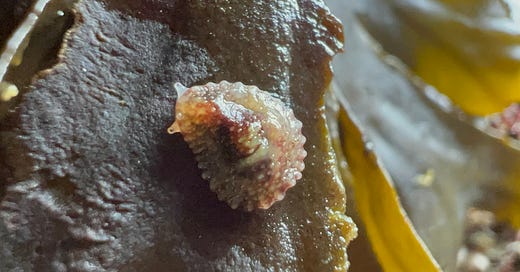This season, as part of the training for beach naturalists with the Seattle Aquarium, we had a speaker talk about queer ecology, Angel Quimbita of Sea Potential. In their talk, Angel gave me a way to better align my nature journaling practice with my values. I want to share what I learned in hopes that others will find it useful.
4 Questions
Angel presented 4 questions to help us, as beach naturalists, connect with the living beings of the intertidal. The four questions are:
How are we similar?
How are we different?
In embracing our differences, what new perspectives can I learn from you?
How can I show gratitude to you for the lessons you have taught me today?
Here’s how I would practice these four questions. Let’s consider Leather Limpet (Onchidella borealis) in the photo above. Don’t let the name fool you. Leather Limpet is not a true limpet. They are more closely related to snails and slugs that live on land than in the marine environment.
How are we similar? We are both air breathers. We both have soft parts. Because they don’t have gills, Leather Limpet likes to live in the high intertidal where conditions are dry and out of the water most of the time. I enjoy the shape, color and texture of the Rockweed (Fucus gardneri) where they are reliably found. We both enjoy eating seaweeds. We both have eyes, eat, and explore our world.
How are we different? Leather Limpet can survive when submerged by holding their breaths or sheltering in an air pocket. Leather Limpet does not have an internal skeleton. They lay eggs. Since Leather Limpet is a slug, I’m going to guess that they are a hermaphrodite, possessing both male and female reproductive organs. I have female reproductive organs only.
In embracing our differences, what new perspectives can I learn? If I’m right about Leather Limpet being a hermaphrodite, this means that they mutually exchange sperm when mating and they also all lay eggs. From this difference I want to think about ways I can make my interactions with people be of equitable exchange such as with time, attention, and care. I also want to find my version of “finding a pocket of air” to shelter in when needed. In other words, embracing the necessity of rest. This practice is the opposite of trying to maximize “productivity” and continuing to work when the best thing to do is rest.
How can I show gratitude to you for the lessons you have taught me today? I will not move you from your chosen home. I will help other people understand what your special needs are. I will explore your home gently and with reverence.
Queer Ecology and Additional Questions
Much of our society is organized by binaries female/male, good/bad, productive/non-productive and it can be very difficult to let this framework go. From Angel’s talk, I came away with the message that the intertidal - the area on the beach that plays peek-a-boo between rising and falling tides - is a “queer” space. In other words, it doesn't fit into a binary. There is much change and flow. It can also be quite turbulent at times and still, many beings learn how to live in this environment. I want to learn from this as well. Life is turbulent at times. There is much ebb and flow. Eventually everything living will come to the end of their life. How can I embrace uncertainty? When is it useful to let go of control? What are ways to find rest and community? all while addressing the turbulence of our times?
My nature journaling practice plays a role in addressing these questions. My nature journaling is primarily about how it makes me feel when I am journaling. At the same time, I celebrate when a journal page is pleasing to me and I feel proud to share it. I also practice sharing the drawings that aren’t how I hoped they would turn out as an antidote to perfectionism. When I am teaching nature journaling or drawing with other nature lovers, I find community.
Thank you for reading A Wild Braid Nature Journal. I am grateful for your attention. If you would like to support my work you can do one or more of the following:
If anything about what I wrote today resonated with you, I would love to hear what it was? If you have any questions or would like to offer your own ideas on decolonizing your nature journaling practice I would love to know that too!
Sincerely,
Alma




Glad to see you writing here again! I've missed your writing.